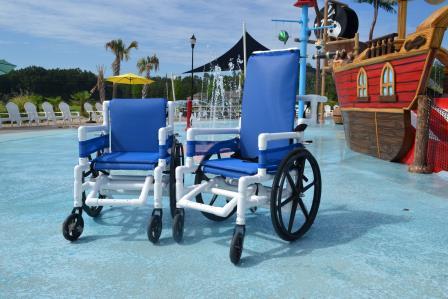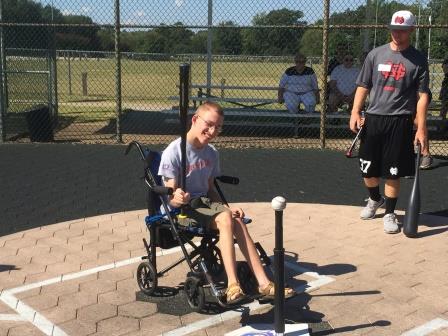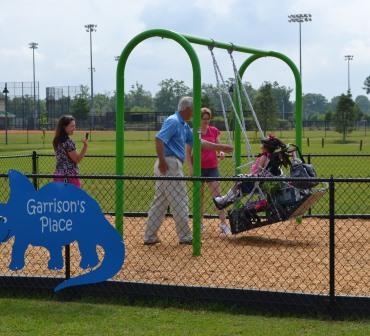From handicapped-accessible playground equipment to miracle fields that let disabled children play organized baseball to beach accesses wide enough for wheelchairs, cities and towns around South Carolina are taking steps to ensure recreation opportunities are available to all.
The federal Americans with Disabilities Act requires newly built or altered state and local government facilities, including parks and recreation centers, be accessible and usable by people with disabilities. Municipalities are working—often with nonprofits or citizen advocates—to remove barriers to parks, playgrounds and beaches.
In Hartsville, two residents led the move to add handicapped-accessible play areas to local playgrounds. One was the mother of a physically disabled boy and another runs a children’s rehabilitation center in town.
"They really are the heart of it. They are truly the champions," said Mary Catherine Farrell, assistant to the city manager and grant writer. "They brought the requests to the city. How can you turn that down?"
The women became not only champions but also advisers, helping the city understand exactly the types of changes needed.
"A lot of things are ADA-compliant, but there’s a difference with something that’s designed for integrated play," said Farrell. "For example, wood mulch is ADA compliant, but then you watch how hard it is for moms to push heavy wheelchairs through mulch."
Hartsville officials committed to adding something in each city playground for handicapped children, and Farrell got busy applying for grants. Grants from a local foundation and the federal Land and Water Conservation Fund have resulted in upgrades and changes at city parks.
Hartsville is now home to Garrison’s Place, a fully-integrated playground that includes a wheelchair-platform swing, adaptive swings and a zip line for children with disabilities. The city added aquatic wheelchairs at the Piratesville Splash Pad at the Byerly Park Recreation Complex and is now applying for a grant to upgrade another playground.

Piratesville Splash Pad, Hartsville
Farrell’s advice for other municipalities looking to make their recreation facilities accommodating to disabled people: "Identify a champion, involve that champion and be creative. We are a small town, but we did our research to identify funding sources."
In Greer, people from around the Upstate head to Kids Planet at Century Park. In 1999, more than 3,000 volunteers assembled the first playground in nine days. Then in 2001, more than 700 volunteers built the accessible playground, Kids Planet Two, featuring handicapped-accessible swings and play areas.
Steve Owens, Greer’s communications manager, suggests partnering with a group such as Able South Carolina, a nonprofit that offers a variety of services and programs that empower people with disabilities to reach their independence.
During the past year, Greer has been inspecting buildings, and parks and recreation facilities to see what type of improvements should be made. Able South Carolina representatives, who understand the issues and know the landscape, accompanied city staff on the inspections, Owens said.
"That’s their wheelhouse. They’d be good for any municipality to talk to," he said.
The coordination between nonprofits and cities is not uncommon when addressing accessible recreation areas.
Summerville’s Miracle Field allows children of all abilities to play baseball. The city owns and maintains the facility, while the Summerville Miracle League organizes the games and the teams, said Doyle Best, the town’s parks and recreation manager. The scaled-down field with a soft-rubber surface features programming for all ages—from young children to disabled adults.
In Myrtle Beach, where the top recreation destination is the city’s 10 miles of beaches, city leaders decided more than seven years ago to offer fully ADA-compliant beach accesses at least every half-mile along the oceanfront. That means having dune walkovers that are accessible to wheelchairs while not harming the dunes.
Parks Superintendent Richard Kirby said the city works closely to meet ADA guidelines while maintaining environmental regulations for dune preservation. The cost averages $70,000 per beach access, with some costing considerably more.
As for parks, this spring Myrtle Beach will open Savannah’s Playground, built on city property by a nonprofit organization. The site is adjacent to Crabtree Memorial Gymnasium in the Market Common district on the site of the former Myrtle Beach Air Force Base.
The enabling playground will be fully ADA-approved to provide children of all abilities the opportunity for social interaction. It includes a ropes and zip line area, accessible swings with a pond view, musical playground equipment, a fishing pier and paddleboats, a fitness trail and more.
The goal is to promote a barrier-free, bias-free world for all children with special needs. It is designed to serve the citizens of Horry County, along with tourists and visitors from all over the world.
"This is pretty amazing; it’s a big deal," Kirby said. "There is nothing like it in the Southeast."
Along with making accommodations to playgrounds and parks, municipalities need to ensure their recreation programming is accessible.
The City of Greer, for example, has had children with autism, epilepsy, cerebral palsy and physical development disorders participate in summer camps, football and soccer programs.
"We make accommodations to support individuals with disabilities who would like to participate in our leagues, summer camps and after-school programs every year," said Ann Cunningham, director of Greer’s parks and recreation department.
"We meet with our staff, parents and coaches to ensure everyone is knowledgeable about any special needs that must be met," said Cunningham. "Depending on the circumstances, we may ask for a release from their doctor to ensure the child’s safety. We also feel that it is important that once the child is placed on a team or in a program, the child is treated just like everyone else."
In Mauldin, the city joined with the Mauldin Miracle League in 2004 to create an accessible baseball field and playground area at Sunset Park. The league provides baseball programs for children and young adults with physical and developmental challenges. The field is also used by the Mauldin Maulers, a softball league for adults in wheelchairs.

Open since 2005, Mauldin's Sunset Park features its own "Field of Dreams."
Photo courtesy of Mauldin Miracle League
The city supports the programs by providing facility maintenance and program assistance, when needed, during special events, according to Kimberly Hamel, director of business and development services in Mauldin.
The Town of Mount Pleasant has a full schedule of programming to improve the physical fitness, motor skill development, and artistic and social skills of people with disabilities, said Recreation Director Ken Ayoub. The town’s Unified Athletic League offers golf, soccer, basketball and Friday socials, while a swim team focuses on swimming technique, fitness and fun.
"Our goal is to remove the barriers that may keep some individuals in the community from participating in recreation activities. Through recreation, participants have the opportunity to become more active, learn a new sport, and improve social skills, all while making new friends," Ayoub said.
"The Unified Athletic League offers the opportunity for all youth and adults to play on a sports team. It joins both youth and adults with disabilities and those without for training and to play together as a team. Smaller fields and modified equipment may be used as needed to ensure fairness and safety for all."
Mount Pleasant offers aquatic programming open to children with severe and multiple disabilities, while instructors offer swim lessons to participants regardless of any limitations. Both of the town pools are ADA-accessible, and each aquatic facility has a set of stairs leading into the pool for easy access for patrons who are unable to climb a ladder. There are two portable aquatic pool lifts that can lift someone up to 300 pounds into the pool, he said.
The town’s summer camps offer programs for children and teens with disabilities. New this year will be four weeks of summer Arts for Autism camp for ages 10 to 14. The camp is designed for verbal autistic youth who will work with a team of trained professionals.
Ayoub offered this advice for municipalities working to improve access to a recreation program: "The families and the community of the disabled are a very close-knit group and in many cases will come together to help the recreation department in providing the programs. Keep this group involved in the development of programs and seek out their opinions and recommendations. Don’t be afraid to try new approaches and techniques when offering a program. Don’t be afraid of failure. Many in the community will appreciate the effort and in most cases will rally around that effort and help the next time."
He also suggested visiting other programs and learning from what is already in place, and involving others outside the immediate community.
"While our program was developing, we had families willing to drive 40 to 50 miles round trip and pay double to get their child involved in programs for the first time," Ayoub said. "Numbers are needed, and if involving participants from outside your community will enable you to offer a program for your residents, then do it."
He also suggested hiring an employee, full- or part-time, who is trained appropriately and who is passionate about the programs and the participants.
Ayoub tells a story that shows the importance of the programs: "When we started our first Unified baseball team, there was a young man who was severely disabled and wheelchair-bound. He became involved in the program. The ball games and socialization of the program became the highlights of his life. He would wear his uniform all the time, even when he was not playing."
"Unfortunately he passed away a few years later. But up to that time, he was involved in the program. At his funeral … he was buried with his uniform on and his first and only baseball glove with him. That image and story are why we will always do what we do. That is the impact that we have on those in our program."

